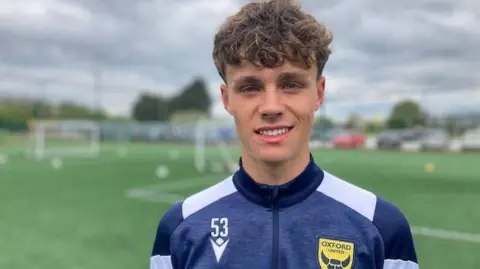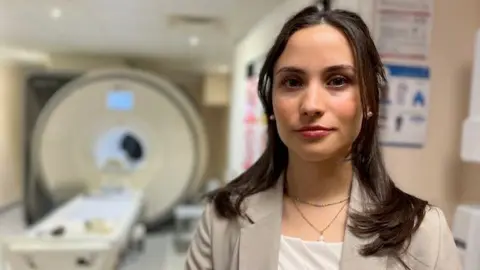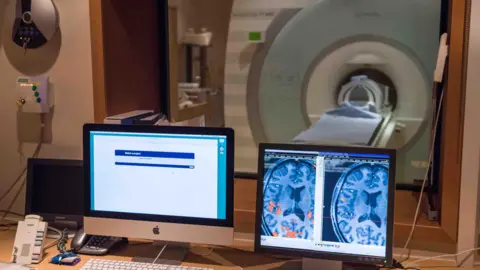Brain injury in young athletes examined in new study
 BBC
BBCVolunteers are being recruited into a two-year study exploring the impact of head injuries on the developing brains of 11 to 18-year-olds.
Researchers at the University of Oxford will use cutting-edge MRI scans to uncover why some children have worse outcomes than others after suffering a head injury during sport.
The advanced imaging techniques will help identify key signs of brain damage that might be missed by a standard CT scan.
Scientists believe it will enable doctors, parents and coaches to predict how well a child will recover after a head injury.
'Long-lasting problems'
Each year, 1.4 million people attend emergency departments in England and Wales with a recent head injury.
Between 33% and 50% of these are children aged under 15 years old.
"The problem at the moment is that when a young person has had a head injury some recover really well and are back to normal within days to weeks," said Izabelle Lovgren, a doctoral student and one of the trial's researchers.
"However, a substantial proportion do end up with long-lasting problems such as impaired mental health, difficulties in concentrating and learning new things and also challenges with activity participation."
It is estimated that up to 30% of children who have suffered a mild traumatic brain injury go on to experience medium or long term symptoms.
However, research in this area remains limited, in particular due to a lack of data concerning head injuries sustained by children and adolescents.

Over the next two years, the study hopes to scan a total of 120 volunteers, aged 11 to 18, who regularly take part in sports.
Half will have experienced a past or recent head injury.
The sophisticated MRI scans will be combined with cognitive tests and questionnaires about the sustained injury.
Oxford United apprentice Jameson, 17, suffered a concussion during a match two years ago and agreed to take part in the trial.
"I just tripped over, my head collided with a boot, straight away I had the effects of feeling dizzy, light headed and physios came on and brought me off," he said.
"After the game I had to do a test called a SCAT5 test and I got deemed to have a concussion so I was sidelined for 21 days."
The Football Association (FA) has specific guidelines for children in football, such as the immediate removal from play for anyone suspected of having a concussion.
The guidelines also include a staged return to play and a ban on heading the ball for children under the age of 12.
"At the moment heading is an important part of the game," said Sam Coleman, Head of Academy Sports Science and Medicine at Oxford United.
"But I think the research that we're involved in here is really important to try and understand what the actual long-term risks are of heading, that's why we're happy to participate."
According to Alzheimer's Research UK, research shows that Traumatic Brain Injury (TBI) increases the risk of developing dementia, especially in men or those affected at a younger age.
 University of Oxford
University of OxfordWhat is Traumatic Brain Injury?
Most research into how head injuries influence our risk of developing dementia focusses on a type of head injury called Traumatic Brain Injury, otherwise known as TBI.
Not all head injuries cause the condition, which only occurs when a head injury disrupts how the brain normally functions.
It can lead to:
- Loss of, or decreased, consciousness
- Disorientation
- Loss of memory before or after the injury occurred
There are three different types of TBI - mild, moderate and severe.
Mild TBI, also known as a concussion, is a brief change in consciousness or mental state.
Severe TBI, however, causes extended periods of unconsciousness, coma and can sometimes be fatal.
(Source: Alzheimer's Research UK)

The Oxford study aims to identify signs of injury in children's brains that could lead to a greater risk of developing long-term conditions such as dementia.
It is seen as a stepping stone to larger trials that will be required to further understand the complex relationship between head injuries and dementia risk.
Tim Lawrence, consultant paediatric neurosurgeon and one of the study's lead researchers, said: "With growing concern regarding a potential link between mild or repetitive traumatic brain injury and long-term cognitive difficulties or even early dementia, there is a pressing need to identify the types of traumatic injuries that may pose a risk.
"Our study is a step towards better understanding of the mechanisms that underpin damage to the brains of children and adolescents suffering injury."
You can follow BBC Oxfordshire on Facebook, X (Twitter), or Instagram.
